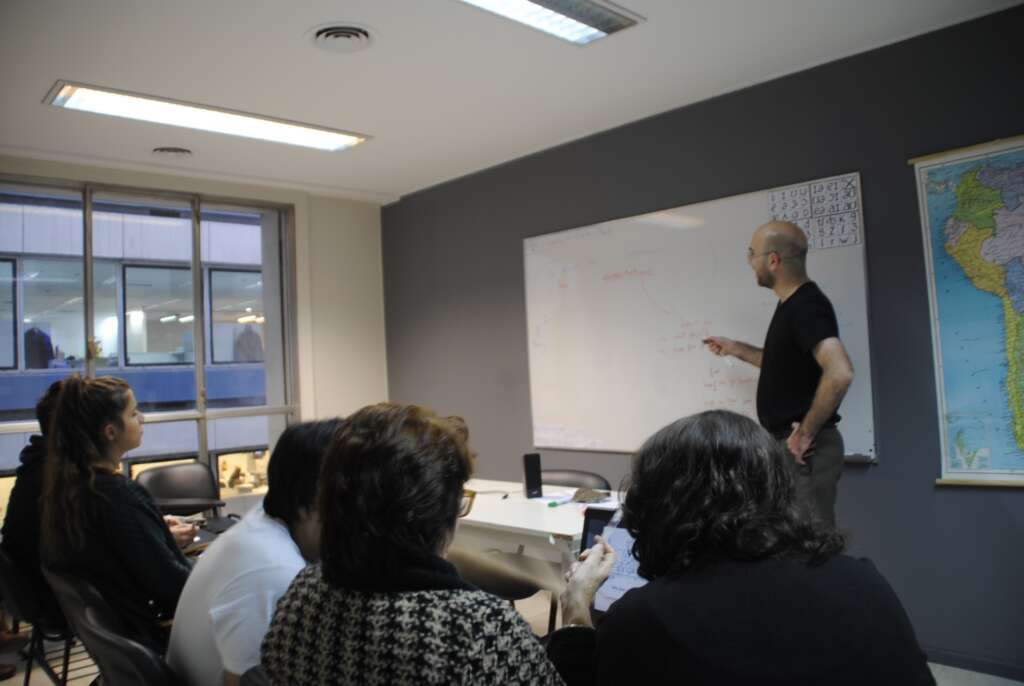The Rising Demand for IELTS Teachers in 2024: Unveiling Opportunities
Introduction to IELTS and Its Importance
In today’s interconnected and globalized environment, the International English Language Testing System (IELTS) has become a cornerstone for measuring English language proficiency, essential for individuals aiming to integrate and excel in English-speaking contexts. This comprehensive assessment evaluates candidates’ abilities across four fundamental skills: reading, writing, listening, and speaking. It acts not just as a measure of language proficiency, but as a gateway to a plethora of opportunities in higher education, professional fields, and immigration.
The widespread recognition of IELTS by educational institutions, governmental agencies, and professional organizations around the world attests to its critical importance. For students, professionals, and migrants, achieving a high score can be a transformative milestone, opening doors to international education, career advancement, and global mobility. Consequently, the demand for skilled IELTS teachers has surged, highlighting the crucial role they play in shaping future global citizens and professionals.
IELTS instructors are more than just language teachers; they are mentors, guides, and the bridge to success in English-speaking environments. Their expertise not only helps learners improve their English language skills but also equips them with the strategies and confidence to excel in the test. The ability to teach IELTS effectively requires a deep understanding of the test’s format, a comprehensive approach to language teaching, and a commitment to helping students achieve their personal best.
As globalization continues to drive the need for English proficiency, the role of the IELTS teacher becomes increasingly significant. By fostering a deep understanding of the English language and its practical applications, IELTS instructors contribute to the global mobility and success of their students, making this teaching role not only important but immensely rewarding.
In the following sections, we will explore the unique challenges and rewards of teaching IELTS, offer insights into the methodologies that underpin effective instruction, and share success stories from the field. Whether you’re an aspiring teacher or an experienced instructor looking to specialize in IELTS, understanding the intricacies of this pivotal exam can transform your teaching approach and amplify your impact on students’ lives.
What is the IELTS Exam?
The International English Language Testing System (IELTS) is a standardized test designed to measure the English language proficiency of non-native speakers who want to study, work, or migrate to English-speaking countries. It is recognized by universities, employers, professional bodies, and immigration authorities worldwide, making it one of the most widely accepted English language tests globally.
IELTS is divided into two main types: Academic and General Training. The Academic IELTS is intended for those who plan to enroll in universities or institutions of higher education and for professionals such as medical doctors and nurses who want to study or practice in an English-speaking country. The General Training IELTS is aimed at individuals moving to English-speaking countries for secondary education, work experience, or training programs, or for immigration purposes to countries such as Australia, Canada, and New Zealand.
The IELTS exam assesses test-takers in four language skills: listening, reading, writing, and speaking. The Listening and Speaking sections are the same for both test types, but the Reading and Writing sections differ depending on whether the candidate is taking the Academic or General Training version of the test.
Listening Section (30 minutes): Consists of four recorded monologues and conversations. Test-takers answer questions on these recordings to assess their ability to understand main ideas, detailed factual information, the opinions and attitudes of speakers, and the purpose of an utterance.
Reading Section (60 minutes): Involves three long texts which range from descriptive and factual to the discursive and analytical. These are taken from books, journals, magazines, and newspapers. The Academic version includes texts suitable for those entering university courses or seeking professional registration, while the General Training version involves extracts from books, magazines, newspapers, notices, advertisements, company handbooks, and guidelines.
Writing Section (60 minutes): In the Academic module, tasks include writing a descriptive report based on a graphic or diagram and writing an essay in response to an argument or problem. The General Training module involves writing a letter and an essay. The essay topics are of general interest and accessible to test-takers entering undergraduate or postgraduate studies or seeking professional registration.
Speaking Section (11–14 minutes): A face-to-face interview with an examiner. The section is divided into three parts: an introduction and interview, a long turn where the test-taker speaks for one or two minutes on a particular topic, and a two-way discussion thematically linked to the individual long turn.
Scores are reported on a band scale from 1 (Non-User) to 9 (Expert User). Test results are valid for two years.
Preparing for the IELTS involves understanding the test format, practicing each language skill, familiarizing oneself with the types of questions asked, and taking practice tests to improve speed and confidence. Candidates are encouraged to use a variety of resources, including books, online courses, and preparation classes, to improve their English skills and test performance.
The IELTS test provides an accurate reflection of the test-taker’s ability to understand, read, write, and speak English in real-life contexts, making it a crucial step for those looking to live, study, or work in an English-speaking environment.

The Rising Demand for IELTS Teachers
As we step into 2024, the realm of English language education is undergoing a significant transformation, with IELTS teachers emerging as a pivotal force in this dynamic landscape. This growing demand for specialized educators is powered by the increasing popularity of the IELTS exam and the worldwide expansion of English language learning programs. Institutions and learners alike are seeking instructors who are not just conversant in English but are adept at navigating the intricacies of the IELTS format.
This trend is not incidental but indicative of broader global movements. As international education barriers lower and professional opportunities abroad become more accessible, proficiency in English as a lingua franca has never been more critical. Consequently, IELTS preparation, as a specialized field, has seen a surge in demand, reflecting the test’s role as a key facilitator of global mobility and communication.
Educators equipped with the skills to teach IELTS find themselves at a premium. They are not only teaching a language but are also unlocking global opportunities for their students. They cater to a diverse clientele, ranging from students aspiring to study in prestigious universities to professionals seeking international careers and migrants looking to start anew in English-speaking countries.
Moreover, the shift towards digital education platforms has expanded the reach of IELTS instruction, breaking geographical barriers and creating a global marketplace for teaching skills. Online IELTS teaching positions are proliferating, offering flexibility and new challenges for educators worldwide. This digital leap further fuels the demand for skilled IELTS teachers, as they adapt to delivering effective preparation through virtual classrooms.

The demand for these educators is expected to continue its upward trajectory, paralleling trends in international student mobility, immigration patterns, and the global job market. As such, being an IELTS instructor today means being at the forefront of a significant educational shift, contributing directly to the global exchange of knowledge and culture.
Characteristics of a Successful IELTS Teacher
The ideal IELTS instructor embodies characteristics beyond those of a standard language teacher. They are distinguished by a unique combination of skills and attributes tailored to meet the specific challenges of the IELTS exam.
Profound Understanding of the English Language: Mastery over the nuances of English is fundamental. A successful IELTS teacher must have a deep understanding of grammar, vocabulary, and idiomatic expressions to guide students effectively. This linguistic proficiency enables them to elucidate complex language rules and assist students in refining their English skills to meet the rigorous standards of the IELTS.
Familiarity with the IELTS Format and Standards: Expertise in the structure, types of questions, and evaluation criteria of the IELTS is crucial. Teachers need to be well-versed with each section of the test (Listening, Reading, Writing, and Speaking) and understand what examiners are looking for. This knowledge is essential for providing targeted guidance and helping students avoid common pitfalls.
Empathetic and Student-Centered Teaching Approach: The best IELTS teachers are those who can put themselves in their students’ shoes, understanding their challenges and anxieties. They adopt a student-centered approach, tailoring their teaching methods to fit the individual learning styles and needs of their students. Empathy in teaching leads to a supportive learning environment where students feel valued and motivated.
Analytical Skills and Problem-Solving Ability: Successful IELTS educators possess the ability to analyze students’ performance critically and identify areas needing improvement. They use this analysis to devise effective teaching strategies and problem-solving techniques, helping students overcome specific linguistic challenges and excel in the exam.
Patience and Perseverance: Teaching IELTS can be demanding, with students at varying levels of proficiency and with different learning paces. Patience is vital in nurturing a positive learning atmosphere where students feel comfortable to practice and make mistakes. Perseverance in encouraging and guiding students through their preparation journey is key to their success.
Continuous Professional Development: The field of IELTS teaching is ever-evolving, with changes in exam formats and teaching methodologies. Successful teachers commit to ongoing learning and professional development to stay updated with the latest educational trends and techniques in IELTS preparation.
Inspirational and Motivational: A successful IELTS teacher inspires confidence and motivation in their students. They encourage persistence and resilience, highlighting the importance of effort and practice. Their enthusiasm and belief in their students’ abilities can significantly impact students’ performance and attitude towards the exam.

Teaching Strategies for IELTS Instructors
The effectiveness of IELTS instruction relies on the strategic application of teaching methods tailored to the exam’s diverse requirements. Below are key strategies employed by successful IELTS instructors to enhance their students’ language skills and confidence:
Diagnostic Assessment: Begin with a diagnostic assessment to understand each student’s strengths and weaknesses. This initial evaluation helps tailor the teaching approach to individual needs, ensuring that time is spent efficiently on areas requiring improvement.
Integrated Skill Development: IELTS assesses reading, writing, listening, and speaking skills. Effective instructors integrate these skills in their teaching, reflecting the interconnected nature of language use in real-world settings. For example, reading passages can be used as a basis for speaking and writing exercises, enhancing comprehension and expression simultaneously.
Practice with Real IELTS Materials: Utilize actual IELTS practice materials and past exam papers. This familiarizes students with the format and types of questions they will encounter, reducing anxiety and improving performance through familiarity.
Mock Exams and Time Management: Regularly schedule full-length, timed practice exams under realistic conditions. This helps students build stamina and improve time management, crucial skills for navigating the time pressures of the actual test.
Personalized Feedback: Provide detailed and personalized feedback on practice tests and assignments. Highlight specific areas for improvement and give actionable advice, focusing on how students can increase their scores in each section of the test.
Strategy Training: Teach test-taking strategies specific to each section of the IELTS, such as skimming and scanning techniques for the reading section, or planning and structuring an essay for the writing section. Equipping students with these strategies can significantly boost their confidence and performance.
Vocabulary and Grammar Building: Expand students’ academic vocabulary and grammatical accuracy, focusing on words and structures commonly encountered in IELTS. Incorporate vocabulary and grammar lessons into the context of IELTS tasks for more relevant and practical learning.
Encouraging Self-Study: Guide students in setting up a consistent self-study schedule and provide them with resources for independent learning. Self-study is crucial for reinforcing classroom instruction and deepening language proficiency.
Speaking and Listening Practice: Create opportunities for speaking and listening practice beyond the exam format, such as group discussions or presentations. This not only builds fluency and listening skills but also helps students become more comfortable expressing ideas in English.
Stress Management and Test-taking Psychology: Address the psychological aspects of taking a high-stakes exam. Teach students stress management techniques and foster a positive mindset to help them approach the test with confidence and calm.
Building a Career as an IELTS Teacher
Embarking on a career as an IELTS instructor offers a path filled with varied opportunities and professional development. Here’s how you can build a rewarding career in this field:
English Proficiency: While there are no official prerequisites to become an IELTS instructor, having a strong grasp of the English language is essential. It’s beneficial if you can achieve a high band score, ideally at least 8, in the IELTS exam yourself.
Educational Background: You should possess an undergraduate degree. The field of study for this degree can vary, but having a background in English, linguistics, or education may be particularly beneficial.
Teaching Certification: A TEFL/TESOL certification, is often required. These certifications equip you with the necessary teaching skills and methodologies relevant to teaching English as a second language.
Teaching Experience: Experience in teaching English is crucial. While the required years of experience can vary, typically, teaching centres and language schools prefer candidates who have at least 2-3 years of teaching experience.
Familiarity with the IELTS Format: Understanding the format, band criteria, and skills measured by the IELTS test is vital. You should be well-versed in the specifics of the exam to guide your students effectively.
Continuous Learning and Networking: Engaging in professional development and joining educational networks can enhance your teaching skills and provide valuable insights into the IELTS teaching field.
Becoming an IELTS Examiner: For those interested in advancing their career, becoming an IELTS examiner is an option. However, it requires additional experience and training, and you cannot simultaneously teach an IELTS class due to conflict of interest considerations.
The Future of IELTS Teaching
Here are some trends and predictions for the future of IELTS teaching:
Technological Integration: The integration of technology in education continues to evolve, and IELTS teaching is no exception. Expect to see a greater reliance on digital platforms, AI technology, augmented reality, and virtual classrooms. This shift not only makes learning more accessible but also allows for innovative teaching methodologies such as immersive learning systems, which takes gamification of learning to the next level.
Personalized Learning Experiences: As technology advances, personalized and adaptive learning will become more prevalent. IELTS teachers will increasingly use AI feedback loops to understand student performance and tailor lessons to suit individual learning styles and needs, leading to more effective and efficient preparation for the exam.
Global Mobility and Online Learning: The demand for English proficiency continues to grow with globalization. As a result, online IELTS teaching will likely continue to see significant growth, providing flexibility for both teachers and learners. This global reach will further enhance cultural exchange and understanding among students and teachers worldwide.
Focus on Soft Skills: Besides teaching language proficiency, there will be a greater emphasis on developing students’ soft skills such as critical thinking, problem-solving, and cultural awareness. These skills are increasingly important in navigating the global landscape and will be integral to IELTS teaching strategies.
Expanding Career Opportunities: The growth in IELTS teaching will open new career paths beyond traditional classroom teaching, including content creation, educational product development, consulting, and more.
Emphasis on Authentic Materials: There will be a shift towards using authentic materials and real-life scenarios in teaching to better prepare students for the practical use of English. This approach not only aids in test preparation but also equips students with language skills that are applicable in real-world contexts.

In conclusion, the future of IELTS teaching is bright and filled with opportunities. Educators who adapt to the changing landscape, embrace new technologies, and focus on providing a holistic learning experience will thrive in this dynamic field. As English continues to dominate as the lingua franca, the role of the IELTS teacher will only grow in importance, making it a promising and fulfilling career choice.
Interested in becoming a specialized IELTS trainer? Keep an eye out for our new course expected to launch shortly. If you aren’t TEFL certified yet, now would be a great time to get started.
